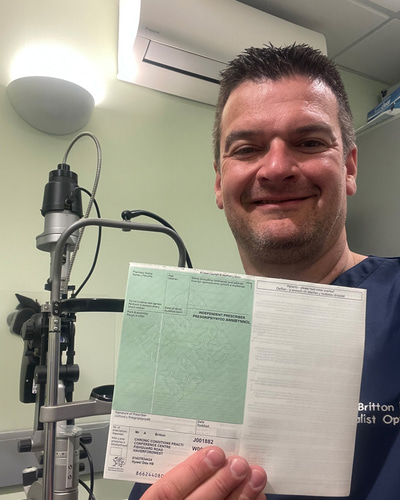- OT
- Life in practice
- Practitioner stories
- My WP10 prescription pad
I could not live without…
My WP10 prescription pad
Andy Britton explains why access to a prescription pad is vital for patient care in his corner of rural Wales


Andy Britton
30 September 2022
In Wales, the government recognises the potential for independent prescribers (IPs) and has made it very streamlined for us to get a WP10 pads.
I’d been asking questions about how IP optometrists could get access to pads even before I was qualified. Our optometric adviser established a mechanism by which we could get access, and because of that the health board was very quick. It was only a couple of months between qualifying and having a WP10 pad. I've now been using it for three years, since 2019.

We pride ourselves in not sending patients with emergencies away, and 20% of my diary is held back for emergency and acute eye care type appointments, which can be complicated. If you’re waiting on the phone, that has an impact on your ability to deliver a service. You either can’t see as many patients, or the patient you should be seeing is being kept waiting, which is detrimental to your business. Obviously, patients don’t enjoy waiting either. With a WP10 prescription pad, I can make the diagnosis, write up the prescription, and start treatment for that patient without them having to make a potentially 100-mile round trip.
Patients who have recurrent eye problems know what the problem is. I know what the problem is. So, it’s really about immediacy and appropriateness of care in a location closer to the patient, at a time convenient to them. Obviously, it also reduces strain on hospitals, so secondary care is only having to deal with the problems only it can deal with.
I’m currently on the final phase of finishing my diploma in glaucoma, which has meant that I can identify patients either having suboptimal responses or adverse reactions to glaucoma medications and communicate with ophthalmology to facilitate timely interventions. It’s about delivering a timely service, close to the patient’s home, in an efficient manner and within a busy practice, and doing the best for the patient at a location convenient to them.
As an experienced IP optometrist, you’re delivering excellent clinical care, the patients like it, and if there’s a concern or a problem it’s very easy to review it
Patients know that they can phone the practice and be seen on the day. They’re not trying to track down nurses or doctors. It improves my practice. I am a much more confident and competent optometrist by virtue of being able to do this, because you get to understand the nuances of treatment.
As an experienced IP optometrist, you’re delivering excellent clinical care, the patients like it, and if there’s a concern or a problem it’s very easy to review it. You review as required, and there’s a continuity of care.
There are two of us in the practice now with WP10s. I’ve got a second colleague who obtained his a month or so ago, and I’ve got another in training who is just waiting for the interminable bottleneck of getting the hospital placement sorted. So soon I’ll have a third, and a fourth is also just starting the IP course.
Within West Wales we have a scheme set up, where the IP optometrist in the area should be the first port of call rather than the patient being sent to the Hospital Eye Service. If a practice that doesn’t have access to IP has a patient with a problem that could be dealt with by an IP optometrist, they should refer them to an IP optometrist. So, we have interprofessional referrals as well. I have phone calls from other practices, from other professionals in the area saying, ‘Look, Mrs Jones has got this problem. Can you see her please Andy?’ It’s not just about looking after my patients, it’s about looking after the wider community.
Advertisement

Comments (0)
You must be logged in to join the discussion. Log in